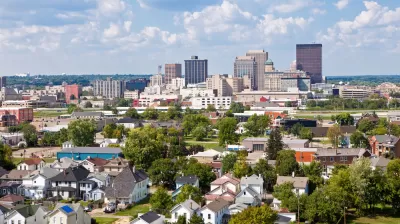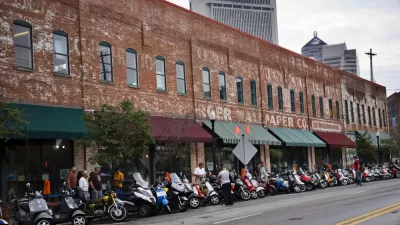Cities like Dayton expect to see a reduction in income tax revenue as more remote workers begin paying taxes to their home jurisdictions.

Officials in Dayton, Ohio and nearby cities remain concerned about a potential loss of income tax revenue from remote workers, even though projections that work-from-home could cost the city up to $20 million in revenue have not materialized this year. In fact, as Cornelius Frolik writes in the Dayton Daily News, “Dayton’s income tax collections were up 7.5% through the third quarter of this year, compared to the same period in 2021, according to city budget documents.”
Dayton workers who live in other jurisdictions are eligible for tax refunds, while employers are required to track remote work and withhold taxes accordingly. “Many employers have never needed to track where their employees live for tax purposes, and it can take time to figure out a good system to do that,” Frolik points out.
“The city believed the work-from-home impact would be more significant and would occur more swiftly, but it is taking time for businesses to create processes and procedures to track and account for remote employees, said Joe Parlette, Dayton’s deputy city manager.” As employers settle on new remote work patterns and set up new processes, Ohio cities are still bracing for potential revenue losses of 3 to 5 percent.
FULL STORY: Area cities losing millions to work-from-home shift, fear the worst is yet to come

Study: Maui’s Plan to Convert Vacation Rentals to Long-Term Housing Could Cause Nearly $1 Billion Economic Loss
The plan would reduce visitor accommodation by 25,% resulting in 1,900 jobs lost.

North Texas Transit Leaders Tout Benefits of TOD for Growing Region
At a summit focused on transit-oriented development, policymakers discussed how North Texas’ expanded light rail system can serve as a tool for economic growth.

Why Should We Subsidize Public Transportation?
Many public transit agencies face financial stress due to rising costs, declining fare revenue, and declining subsidies. Transit advocates must provide a strong business case for increasing public transit funding.

How to Make US Trains Faster
Changes to boarding platforms and a switch to electric trains could improve U.S. passenger rail service without the added cost of high-speed rail.

Columbia’s Revitalized ‘Loop’ Is a Hub for Local Entrepreneurs
A focus on small businesses is helping a commercial corridor in Columbia, Missouri thrive.

Invasive Insect Threatens Minnesota’s Ash Forests
The Emerald Ash Borer is a rapidly spreading invasive pest threatening Minnesota’s ash trees, and homeowners are encouraged to plant diverse replacement species, avoid moving ash firewood, and monitor for signs of infestation.
Urban Design for Planners 1: Software Tools
This six-course series explores essential urban design concepts using open source software and equips planners with the tools they need to participate fully in the urban design process.
Planning for Universal Design
Learn the tools for implementing Universal Design in planning regulations.
Ascent Environmental
Borough of Carlisle
Institute for Housing and Urban Development Studies (IHS)
City of Grandview
Harvard GSD Executive Education
Toledo-Lucas County Plan Commissions
Salt Lake City
NYU Wagner Graduate School of Public Service





























